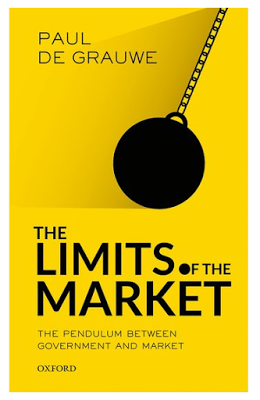Summary:
Paul De Grauwe is Professor at the London School of EconomicsThe EU will celebrate on March 25th the 60th anniversary of its founding (Treaty of Rome, 1957), while its future is in doubt. What went wrong?First of all, the European Union is still to be called a success. It created the basis for peace and material welfare in Europe. This being said there are major problems. The most important one is that the benefits of the European integration have been shared in a very unequal way. Many have profited a great deal. But too many have not. Driven by notions of competitiveness and growth the European Union has neglected social policies aimed at integrating the losers of the European integration. This is a similar story as the globalization story. In your recently published book, you tackle the old discussion of “Market vs. State” and you talk about a “great shift in the power of national governments relative to the financial markets”. Is the supremacy of the markets (neoliberal economic policy) Europe’s main predicament?It is indeed a big problem. The problem is most acute in the Eurozone where national governments have lost most of their capacity to stabilize their economies from the booms and busts that are endemic in capitalism. Instead financial markets dictate the extent to which governments use fiscal policies to stabilize their economies.
Topics:
Acemaxx-Analytics considers the following as important:
This could be interesting, too:
Paul De Grauwe is Professor at the London School of EconomicsPaul De Grauwe is Professor at the London School of EconomicsThe EU will celebrate on March 25th the 60th anniversary of its founding (Treaty of Rome, 1957), while its future is in doubt. What went wrong?First of all, the European Union is still to be called a success. It created the basis for peace and material welfare in Europe. This being said there are major problems. The most important one is that the benefits of the European integration have been shared in a very unequal way. Many have profited a great deal. But too many have not. Driven by notions of competitiveness and growth the European Union has neglected social policies aimed at integrating the losers of the European integration. This is a similar story as the globalization story. In your recently published book, you tackle the old discussion of “Market vs. State” and you talk about a “great shift in the power of national governments relative to the financial markets”. Is the supremacy of the markets (neoliberal economic policy) Europe’s main predicament?It is indeed a big problem. The problem is most acute in the Eurozone where national governments have lost most of their capacity to stabilize their economies from the booms and busts that are endemic in capitalism. Instead financial markets dictate the extent to which governments use fiscal policies to stabilize their economies.
Topics:
Acemaxx-Analytics considers the following as important:
This could be interesting, too:
finews.ch writes Varghese Abraham: «Ein Leitfaden für AI-first Banking»
finews.ch writes Pensionskassen auch im April mit Verlusten
investrends.ch writes Das sind die zehn grössten Ärgernisse im Flugzeug
investrends.ch writes «Stewardship: Zwischen Rückzug und Resilienz»
The EU will celebrate on March 25th the 60th anniversary of its founding (Treaty of Rome, 1957), while its future is in doubt. What went wrong?
First of all, the European Union is still to be called a success. It created the basis for peace and material welfare in Europe. This being said there are major problems. The most important one is that the benefits of the European integration have been shared in a very unequal way. Many have profited a great deal. But too many have not. Driven by notions of competitiveness and growth the European Union has neglected social policies aimed at integrating the losers of the European integration. This is a similar story as the globalization story.
In your recently published book, you tackle the old discussion of “Market vs. State” and you talk about a “great shift in the power of national governments relative to the financial markets”. Is the supremacy of the markets (neoliberal economic policy) Europe’s main predicament?
It is indeed a big problem. The problem is most acute in the Eurozone where national governments have lost most of their capacity to stabilize their economies from the booms and busts that are endemic in capitalism. Instead financial markets dictate the extent to which governments use fiscal policies to stabilize their economies. If nothing is done about this, many people will reject the system.
Germany gets blamed to exploit the US and its EU partners by using an undervalued EUR. What is your take on the impact of new US policies in Europe? How is Europe supposed to react?
The biggest danger coming from Washington is the threat of protectionism. If the Trump administration puts its threat of imposing import tariffs into practice, Europe would have to retaliate by imposing tariffs on American imports. This would trigger a trade war that would harm everybody. Europe would however have no other choice than to retaliate.
Thank you very much.
Paul De Grauwe is Professor at the London School of Economics. His research interests are in the economics of monetary unions and behavioural macroeconomics.
His book publications include The Economics of Monetary Union (2016) and Lectures on Behavioral Macroeconomics (2012).
The current one is “The Limits of the Market”, published by Oxford University Press, 2017.

